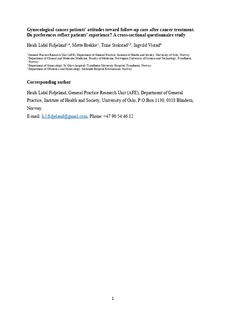Gynecological cancer patients' attitudes toward follow-up care after cancer treatment: Do preferences reflect patients' experience? A cross-sectional questionnaire study
Journal article, Peer reviewed
Accepted version
Permanent lenke
http://hdl.handle.net/11250/2598843Utgivelsesdato
2018Metadata
Vis full innførselSamlinger
Originalversjon
Acta Obstetricia et Gynecologica Scandinavica. 2018, 97 1325-1331. 10.1111/aogs.13396Sammendrag
Introduction
Due to an increasing number of cancer patients, new follow‐up models are being debated, among them follow‐up by general practitioners. Before changing surveillance, it is important to explore patients’ views. The purpose of this study was to compare attitudes toward follow‐up care among patients treated for gynecological cancer who had not yet started a follow‐up regimen, with those who had been attending a hospital‐based follow‐up regimen for more than one year.
Material and methods
We conducted a cross‐sectional survey among gynecological cancer patients recruited from three Norwegian hospitals in 2013‐2015: Sørlandet Hospital Kristiansand, Sørlandet Hospital Arendal and St. Olavs Hospital, Trondheim.
Results
In all, 239 patients agreed to participate, 100 who had not yet started follow‐up and 139 who had been attending more than one year of follow‐up. Patients reported that they preferred to be followed up by a gynecologist rather than by their GP, whom they viewed as less competent for this purpose. However, patients who had not yet started follow‐up were more willing to be followed up by a GP. Overall, patients rated detection of recurrence as the most important aspect of follow‐up visits.
Conclusions
The gynecological cancer patients in our study preferred a hospital‐based follow‐up model. However, patients who had not yet started follow‐up were more willing to be followed up by a GP. If follow‐up is to be provided by GPs for selected patients, it is important that these patients are informed early of the value and limitations of follow‐up visits, to ensure that they feel safe.
